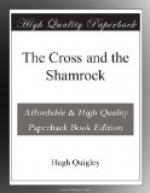This was the Rev. Dr. Dilman who took Eugene under his care about whom Reuben Prying remarked, after he had left the house, that the doctor was a “real smart man.” “Your church, Murty,” said he, “can’t scare up such a grand preacher as that. Did you hear that lecture he delivered last winter against Popery? He is an honor to our church, I can tell you.”
“Why so?” said Murty; “what has he done that you esteem him so high?”
“Nothin’, but bein’ so eloquent and talented, and able to address such a feeling prayer to his hearers.”
“Bless you, I know one much more talented than ever he will be,” said Murty.
“I guess not, Murty,” said he, shaking his head; “who is it?”
“Why, the devil,” said Murty, “beats him all to pieces. Your parson only opposes the pope, you say; whereas the devil opposes both the pope and the Almighty. What is any of your ministers to great ‘Ould Harry’? I bet you are beat now. Ha! ha! ha!” said the Irishman, laughing.
“You are a curious feller, Murty,” said Mr. Prying.
“Am I not right?” said Murty. “You praise your minister, not because he is good, charitable, humane, chaste, or pious, (all which he possibly may be,) but solely because he is talented or endowed with genius. Well, then, I tell you this gains him no merit, for he received this gift from God. He may abuse it; and, at any rate, the devil, the very enemy of God, is endowed with more genius than he and all the Protestant parsons living put together. I think this is fair arguing, Mr. Prying, don’t you?”
“Let’s drop it, Murty,” said Mr. Prying, not liking to hear any more of such “arguing,” particularly as the children were present, and seemed much to enjoy the home-spun comparison between the Dominie Dilman and “Old Harry.” This was the first time they were observed to laugh since the departure of poor Eugene.
Meanwhile, poor Eugene arrived in the city of the parsonage of his reverend protector, where he was received with apparent affection by that gentleman’s wife. During the first three days after his arrival, several of the “saints,” male and female, of the doctor’s church, came to see the new acquisition, as well as to congratulate the parson on the success of his plan. The little orphan was flattered, caressed, and encouraged by the promise of nice clothes and other presents. And it would be unnatural to expect that the innocent heart of a child of his age, now between eight and nine years, could remain insensible to the caresses and favors bestowed. The little lad felt quite content; nay, a gradual sunshine began to spread over the calm melancholy of his angelic face.
They first imposed on the child by telling him that his reverend protector was the priest. He believed it for some time; but when, after two weeks were elapsed, he was permitted to go to church, he was perfectly surprised at “the quare way the priest said mass.” He saw no candles lighted on the altar. He heard no little bell rung at various parts of the service. He saw no persons “bless themselves” there, either. “I suppose,” said he to himself, “they would not tell a lie; but that was a very strange mass I was at to-day.”




